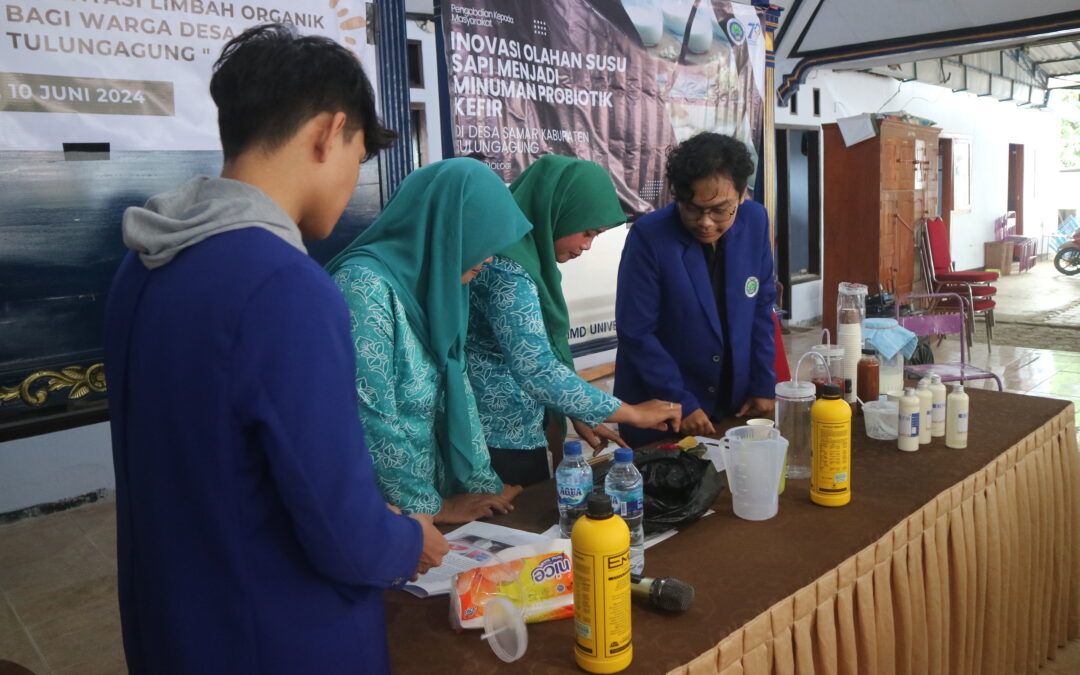
by Admin02 | Jul 9, 2024 | SDGs 13 Penanganan Perubahan Iklim, SDGs 15 Ekosistem Daratan
Community service is the implementation of knowledge aimed at addressing societal issues. Universitas Negeri Malang is committed to engaging in these community service activities as part of the Tri Dharma of Higher Education. One of the initiatives has been undertaken by a team of lecturers and students from the Biotechnology Study Program of FMIPA UM in the village of Samar, Tulungagung Regency, where the main training event took place on Monday, June 10, 2024.
As a fostered village of UM, the women of the Samar village PKK group mentioned that, until now, fruit and vegetable waste from daily cooking activities has just been discarded. The Biotechnology Program team from UM saw an opportunity to utilize this organic waste to produce eco-enzymes. “The fermentation technique used in the production of eco-enzymes will result in a brown, acidic liquid that can be used as a multi-purpose solution, ranging from a cleaning agent to an insecticide and even a fertilizer,” said Dr. Norman Yoshi Haryono, the head of the activity team, to the participants.
A positive response was shown by the participants during the dissemination session, where they were directly trained in the relatively easy process of making eco-enzymes. Enthusiasm was also displayed by Mr. Rubik Astono, the Head of Samar Village, who advised all participants of this community service activity, “My hope is that the women can continue making eco-enzymes at home and that this training activity doesn’t end today. Moreover, if the production of eco-enzymes can be coordinated into one of the flagship products of Samar Village,” he concluded. This community service activity, focusing on processing waste into marketable products, represents UM’s support in realizing the Sustainable Development Goals, particularly concerning climate action (point 13) and life on land (point 15).
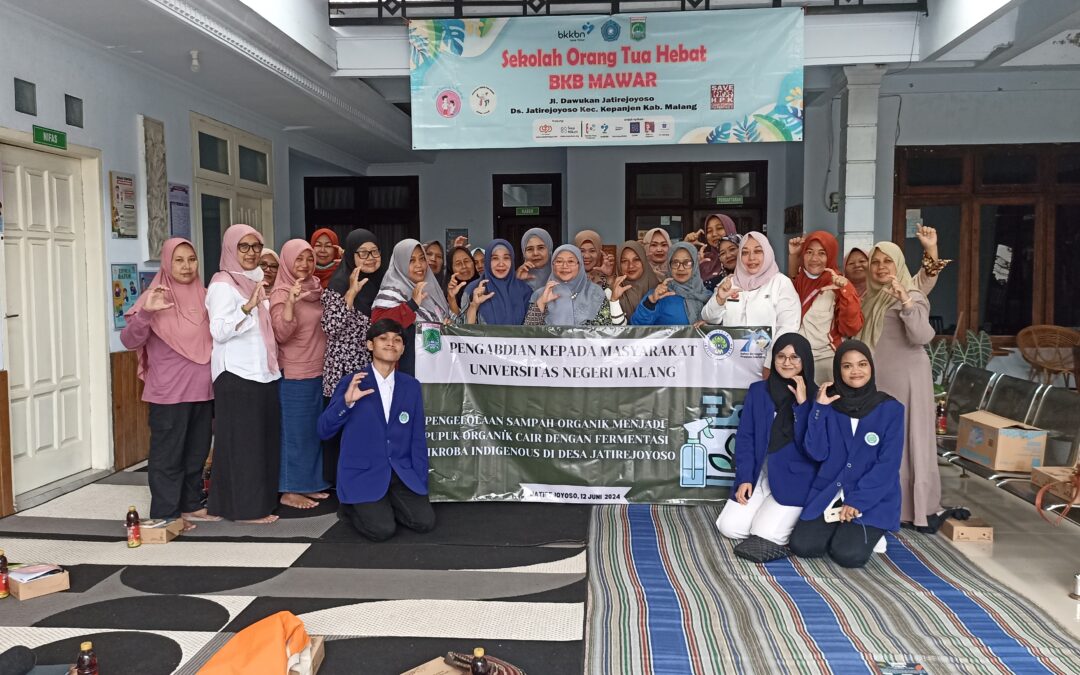
by Admin02 | Jul 9, 2024 | SDGs 15 Ekosistem Daratan, SDGs 3 Kehidupan Sehat dan Sejahtera, SDGs 7 Energi Bersih dan Terjangkau, SDGs 8 Pekerjaan Layak dan Pertumbuhan Ekonomi
BENEFICIAL: Training Atmosphere of UM in Jatirejoyoso Village, Malang Regency
The Community Service Team of Universitas Negeri Malang (UM), consisting of lecturers and students from the Biotechnology Study Program, Department Applied Science, Faculty of Mathematics and Sciences, held a training on making organic fertilizer from agricultural waste for plant fertilizers in Jatirejoyoso Village, Malang Regency. This activity, which took place at the house of the head of the Family Welfare Empowerment of Jatirejoyoso Village last Wednesday (12/6), was attended by the women of the Family Welfare Empowerment of Jatirejoyoso Village.
Mrs. Didit, as the head of the Family Welfare Empowerment of Jatirejoyoso Village, stated that Jatirejoyoso Village is predominantly inhabited by farmers. Therefore, the training on making organic fertilizer from corn husks and straw waste is very suitable as a skill set for the residents. Until now, corn husks in Jatirejoyoso Village have been limited in use, primarily as animal feed, and have not been used as fertilizer, the same goes for straw, said the Family Welfare Empowerment chairwoman. Hence, the Community Service Team, led by Ratna Juwita Ph.D, innovated by turning corn husk and straw waste into liquid organic fertilizer for environmentally friendly agriculture.
The training activity on making organic fertilizer from agricultural waste also provided new business ideas for the Family Welfare Empowerment women. The Family Welfare Empowerment women in Jatirejoyoso Village, Malang Regency were very enthusiastic about participating in the training and mentoring, as evidenced by the numerous questions asked by the participants. Each participant received a brief tutorial on how to make the organic fertilizer. Ratna hopes that after the training ends, the Family Welfare Empowerment women can practice making organic fertilizer at home and that one day it could become a product of Micro Small and Medium Enterprises in Jatirejoyoso Village. “We provided a set of fermentor equipment and also gave the products we had produced on a small scale to the training participants,” she stated. Ratna also hopes that this training activity can improve the skills of the Family Welfare Empowerment women in Jatirejoyoso Village. “The results of the survey filled out by the participants showed a desire for more training utilizing other village potentials,” she concluded.
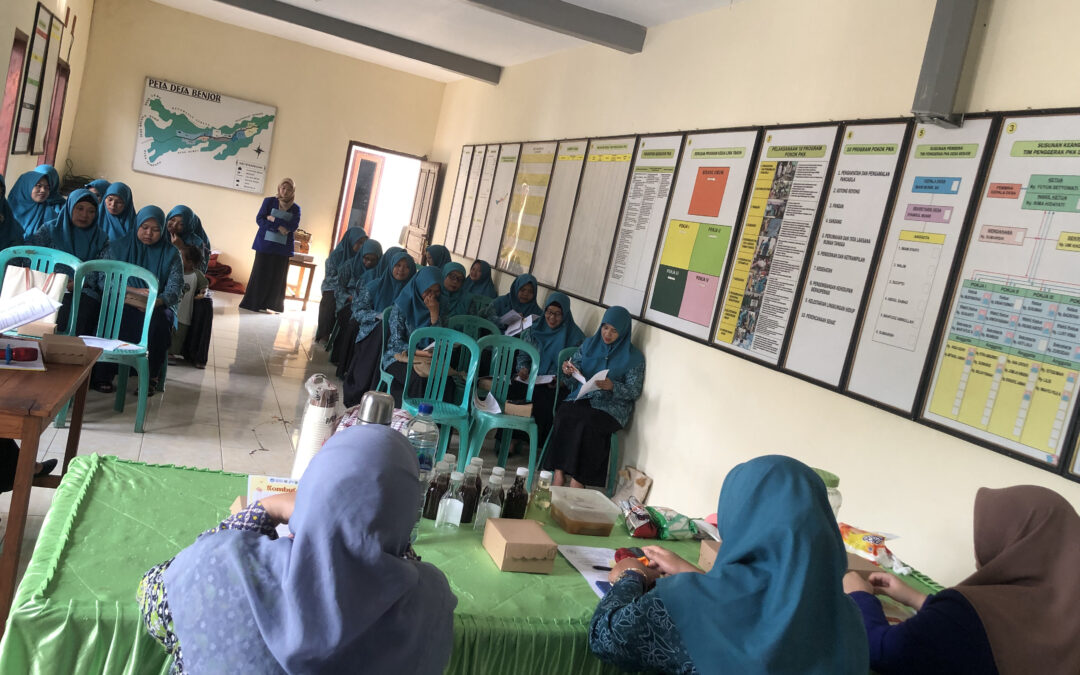
by Admin02 | Jul 9, 2024 | SDGs 15 Ekosistem Daratan, SDGs 3 Kehidupan Sehat dan Sejahtera, SDGs 7 Energi Bersih dan Terjangkau, SDGs 8 Pekerjaan Layak dan Pertumbuhan Ekonomi
COMMUNITY SERVICE: A team of lecturers and students from Biotechnology Study Program, FMIPA UM trains Family Welfare Empowerment women in Benjor Village, how to make kombufee drinks.
After completing their service in Blitar Regency, the Community Service team of Universitas Negeri Malang moved to Malang Regency. This time, lecturers and students from the Biotechnology Study Program, Faculty of Mathematics and Sciences held training on making kombufee from coffee beans in Benjor Village, Malang Regency. This activity was held at the Benjor Village Hall, last Saturday (15/6) with participants from the Benjor Village Family Welfare Empowerment women. This activity supports SDGs 3, 7, 8, and 15.
Mrs. Yuyun, as the head of the Benjor Village Family Welfare Empowerment, said that Benjor Village is a village that produces coffee beans and sugar cane with the livelihood of its residents as farmers, so training in making kombufee made from coffee beans is very suitable. Especially to provide skills for its citizens. “Until now, the use of coffee beans in Benjor Village is still limited, on average they are only sold in the form of coffee beans and have never been used as a kombufee drink,” she said. For this reason, the Community Service team led by Ratna Juwita Ph.D innovated by making kombufee into a probiotic drink that can be enjoyed anytime and anywhere.
The training on making kombufee from coffee beans also provided new ideas for Family Welfare Empowerment women in entrepreneurship. They were also very enthusiastic about participating in the training activities. This can be seen from the various questions asked by the training participants. Each participant who attended was given a short tutorial on how to make kombufee.
Ratna hopes that after the training ends, Family Welfare Empowerment women can practice kombufee themselves at home and hope that one day it can become a product of the Micro Small and Medium Enterprises in Benjor Village. “We also provide our products which we have produced ourselves on a small scale to training participants,” she said.
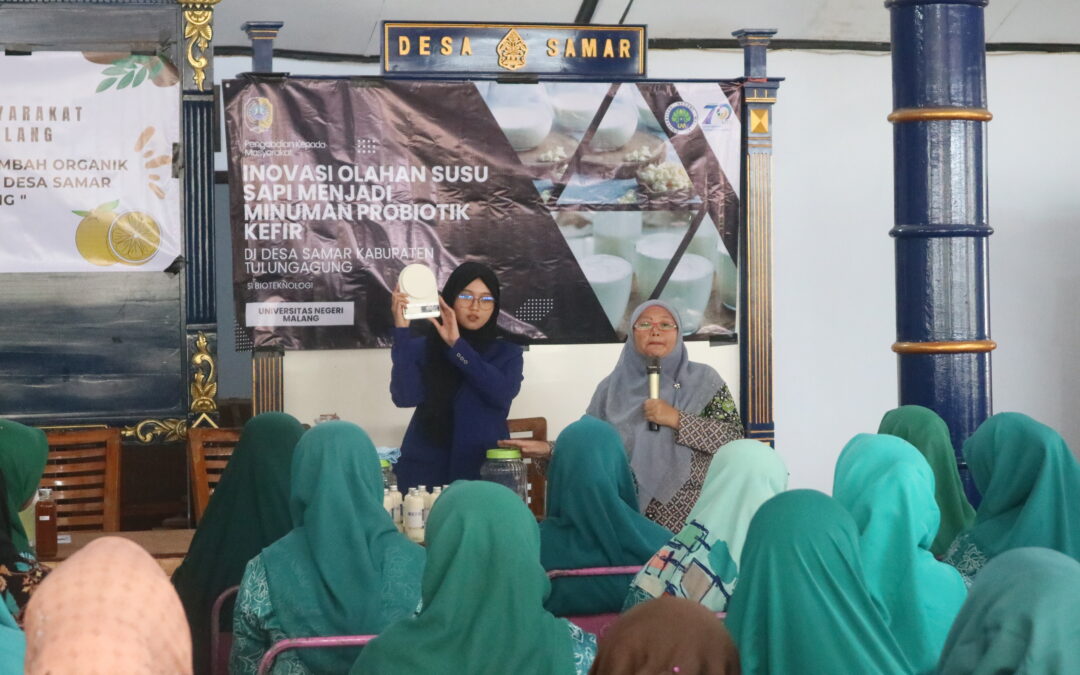
by Admin02 | Jul 9, 2024 | SDGs 15 Ekosistem Daratan, SDGs 3 Kehidupan Sehat dan Sejahtera, SDGs 7 Energi Bersih dan Terjangkau, SDGs 8 Pekerjaan Layak dan Pertumbuhan Ekonomi
COMMUNITY SERVICE: A team of lecturers and students from Biotechnology Study Program, FMIPA UM trains Family Welfare Empowerment women in Samar Village, how to make kefir drinks. Still from this edition, the Community Service Team of Universitas Negeri Malang, consisting of lecturers and students from the Biotechnology Study Program, Faculty of Mathematics and Sciences, held training in Samar Village, more precisely processing milk into kefir drinks. This activity took place at the Samar Village office, Monday (10/6) and was attended by Samar Village Family Welfare Empowerment women. This activity supports SDGs 3, 7, 8, and 15.
Mrs. Rubik, as the head of the Samar Village Family Welfare Empowerment, said that in this village it is very easy to find pure cow’s milk. Many women here work as milkers. Until now, cow’s milk in Samar Village is only sold in the form of fresh milk, there has never been any processing related to cow’s milk. Meanwhile, cow dung is used for biogas. The use of fresh milk and cow dung continues to be sustainable, so that the land ecosystem remains sustainable, the environment becomes clean and affordable (supports SDGs no. 7 and 15). Therefore, the Community Service Team led by Ratna Juwita Ph.D innovated by making milk into a kefir drink that is liked by all groups and can be enjoyed at any time. This innovation was carried out because Samar Village is the village with the largest milk producer in Tulungagung Regency. The nutritional content in milk such as fat, protein, carbohydrates, calcium and vitamin A is very good for health. “This kefir drink can maintain a healthy digestive system, so it is good for consumption every day, supporting SDGs no. 3”, she said.
This training activity on making kefir drinks provides new ideas for entrepreneurship, so that it can open a job opportunity and increase economic growth, especially in Samar Village (supporting SDGs no. 8). The Family Welfare Empowerment women of Samar Village, Tulungagung Regency were very enthusiastic about participating in the training and mentoring activities as seen from the various questions asked by the training participants. Each participant who attended was given a short tutorial on how to make kefir drinks, and participant representatives received a set of tools for making kefir drinks. Ratna hopes that after this training ends, Family Welfare Empowerment women can practice it themselves at home and hope that one day they can become a product of the Micro Small and Medium Enterprises in Samar Village. “We also provide our products which we have produced ourselves on a small scale to all training participants,” she said. Ratna also hopes that this training activity can improve the skills of Family Welfare Empowerment women in Samar Village. “From the results of the survey that was completed by the participants, the results showed a desire to make kefir products,” she concluded.
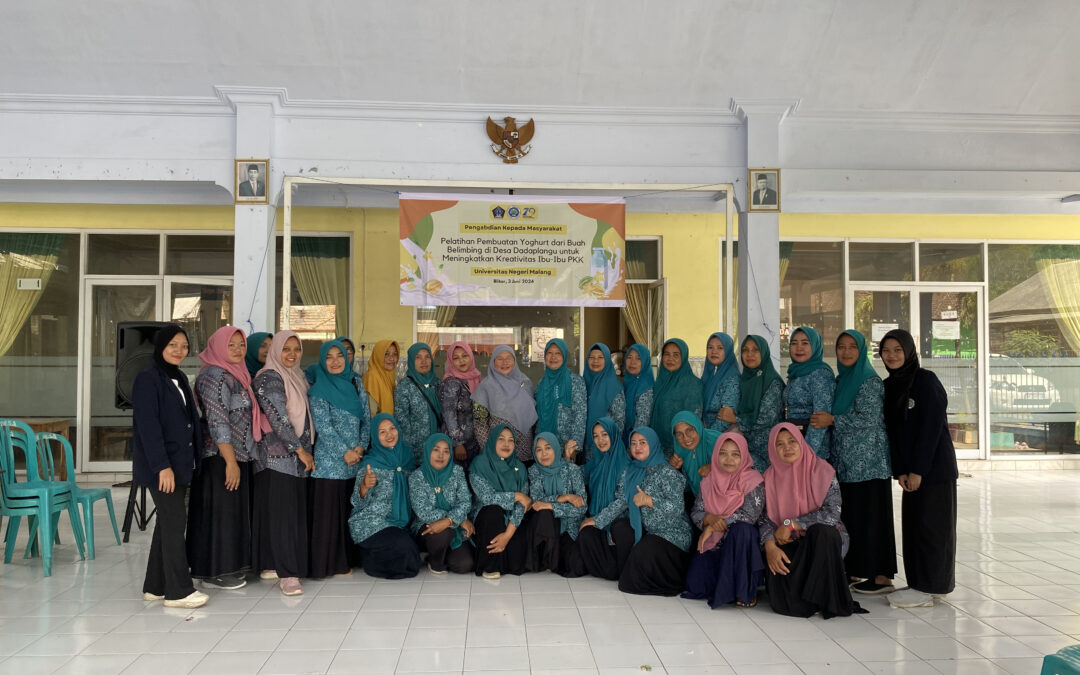
by Admin02 | Jul 9, 2024 | SDGs 15 Ekosistem Daratan, SDGs 3 Kehidupan Sehat dan Sejahtera, SDGs 7 Energi Bersih dan Terjangkau, SDGs 8 Pekerjaan Layak dan Pertumbuhan Ekonomi
COMMUNITY SERVICE: A team of lecturers and students from Biotechnology Study Program, FMIPA UM trains Family Welfare Empowerment women in Dadaplangu Village, how to make starfruit yoghurt.
The Community Service Team of Universitas Negeri Malang (UM), consisting of lecturers and students from the Biotechnology Study Program, Faculty of Mathematics and Sciences, held training on making yoghurt drinks from star fruit in Dadaplangu Village, Ponggok District, Blitar Regency. This activity was carried out directly at the Dadaplangu Village Office, Monday (3/6) and was attended by Family Welfare Empowerment women from Dadaplangu Village. This activity supports SDGs 3, 7, 8, and 15.
Mrs. Rokimun as the head of Family Welfare Empowerment’s Dadaplangu Village said that this training was eagerly awaited because it gave Family Welfare Empowerment women ideas for making innovative drinks from star fruit which is very abundant and easy to find in Dadaplangu Village. Until now, star fruit in Dadaplangu Village is only consumed in the form of fresh fruit, while those that are not sold or are attacked by pests are used for animal feed so that the use of terrestrial ecosystems remains sustainable, the environment remains clean and affordable (supports SDGs no. 7 and 15). Therefore, the Community Service Team led by Ratna Juwita Ph.D innovated by making star fruit into a yoghurt drink that is liked by all groups and can be enjoyed at any time. This innovation was carried out because star fruit contains a lot of vitamin C, apart from that it also contains vitamins A, B9 (folic acid), B3 (niacin), iron, magnesium, manganese, potassium and β-carotene which are really needed by the body. “This yoghurt drink can maintain a healthy digestive system, so it is good for consumption every day, supporting SDGs no. 3”, she said.
This training activity on making yoghurt drinks from star fruit extract also provides new ideas for entrepreneurship, so that it can open a job opportunity and increase economic growth, especially in Dadaplangu Village (supporting SDGs no. 8). The Family Welfare Empowerment women of Dadaplangu Village, Ponggok District, Blitar Regency were very enthusiastic about participating in the training and mentoring activities as seen from the various questions asked by the training participants. Each participant who attended was given a short tutorial on how to make yoghurt drinks from star fruit. Ratna hopes that after this training ends, Family Welfare Empowerment women can practice it themselves at home and hope that one day they can become a product of Micro Small and Medium Enterprises in Dadaplangu Village. “We also provide our products which we have produced ourselves on a small scale to all training participants,” she said. Ratna also hopes that this training activity can improve the skills of Family Welfare Empowerment women in Dadaplangu Village. “From the results of the survey that was completed by the participants, the results showed good, because they felt they had gained additional skills with new knowledge that they had never known before,” she concluded.





